The Checker Maven
Jump to navigationWhen I Played Checkers For My Life

We've published a great deal of checker fiction in The Checker Maven, nearly all of it our own, so it's a special occasion when we come across a piece that is new (to us) by another author. Today we present When I Played Checkers For My Life, taken from a 1908 issue of The Canadian Checker Player. The story is attributed to an S. L. Merrill and first appeared on January 18, 1908 in the Lewiston Journal of Lewiston, Maine. Despite searching old newspaper archives and city directories, we've found no information on Mr. Merrill, but his story, running about 2,800 words, is a good one containing a nice checker problem about three-fourths of the way in. Illustrations have been added by us.
by S. L. Merrill
From my early childhood, I have been a lover of the game of draughts or "checkers" as it is more generally known. My grandfather who lived in Cumberland county, was regarded even after he had passed his 70th year, as one of the most formidable opponents in the "Pine Tree State," to meet across the board. One of my earliest remembrances is of being permitted to sit up an occasional evening after "little folks should be in bed," to see the veteran play the good old game, in the old fashioned way. Intense, ofttimes bitter, was the rivalry, and exciting were the contests between the local champions; and ofttimes the friendly intervention of a third party was necessary to restore harmony and good will.
I remember well the low studded kitchen, with its quaint furnishings, also the spacious old-fashioned fireplace, with its massive andirons, and its huge back log, while a small wagon-load of pine knots crackled and threw a soft and cheerful light, even to the farthest corner of the room.
The dingy asthmatic hand bellows, battered by long years of service, hung on the wall close by.
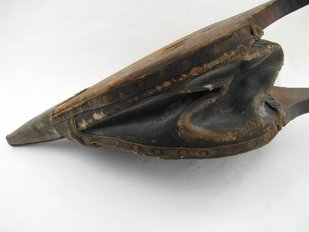
In the spacious chimney-corner stood, where it had stood for years, the old arm chair, whose cushioned depths, "Tip," the household tabby cat--- a handsome "tortoise shell" of sedate manner, and of usual size--- had shared for sixteen years with my grandfather. She was in all respects a privileged character, and invariably when the neighbors came in of evenings to have a friendly game, she would leave her cozy place by the fireside, jump upon the table, and curling herself up in a comfortable position, would watch with close attention and apparent understanding, every move made by the grave and gray-bearded men who had come to give battle to "Uncle Zaccheus," as he was affectionately called by all who knew him.
At times when disputes waxed hot between the belligerents, she would rise to a sitting position and lash her tail impatiently to and fro, as if in full sympathy with the question involved.
In those days, especially in the country towns, "bookplay" was a thing comparatively unknown, and the terms, "Ayrshire Lassie, "Maid of the Mill" and "Glasgow" were as unintelligible to the average player as would have been the cuneiform inscriptions upon the walls of Karnak.
The favorite opening--- in fact, one of the very few practiced--- was the "Single Corner." As an old Vermont farmer, and a clever checker player of the old school, once said to me: "In those good old days we used to start in with 11-15 , 22-18, 15-22, 25-18, 8-11 , 29-25, 10-15, 25-22, 4-8, 24-20. 12-16, 27-24, and we thought that we had quite a good game for Whites. But some of those city fellows came up here one summer and played at this point 16-19, 23-16, 12-19, 24-15, 9-14, 18-9, 11-25, and there we were, left like a ship without her rudder. We old fellows now have to take a back seat."
Naturally, with those opportunities for observation, I early mastered the rudiments of the game, and under the tutelage of my grandfather, who took great pride in my progress, I found myself, at the age of sixteen, a match for any of the local aspirants for championship honors; even for my venerable tutor, who ever seemed to be greatly pleased , and in no ways discomfited by reason of my superior play.
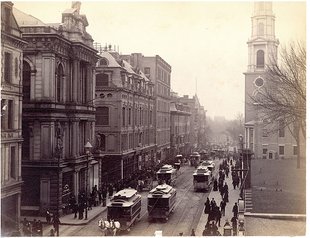
About this time my parents removed to Boston, Mass., where my studies at school, and, later on, my business , afforded me but little time to indulge in my favorite game. Among the acquaintances formed in connection with my business was a young man, about my own age, named Bert Halliday, with whom I was soon on terms of closest intimacy. Our tastes were similar, and we soon be came "chums" in every happy sense that the term implies. As it had been several months since I had studied the "magic squares" naturally the subject of checkers had never been discussed between us.
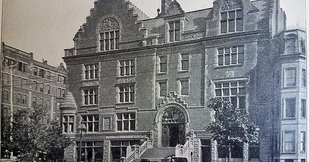
I had no intimation that my friend possessed any knowledge of the game, until one evening he asked me to accompany him to the rooms of the Y.M.C.A. There to my surprise and pleasure, I saw over a dozen tables "set up" in the room and several games in progress. The old-time love for the game came back to me and I watched with intense interest many of the famous Scotch openings, with their intricate problems and crafty variations, which were both admirably played and sharply contested.
It was not long before one of the seats was vacated , and Halliday sat down. His adversary was a man of middle age, whose play had especially attracted my attention by reason of the summary manner in which he had disposed of his late opponents. My friend seemed to be in no way awed or embarrassed as he faced the expert, but started in, in an off-hand manner, that clearly showed his confidence in his own ability to make a creditable score where all others had failed.
The first game was the "File"--- drawn! This was followed by the "Glasgow" and "Defiance," both of which were won by Halliday. The stranger then opened with the "Bristol," which after a hard-fought battle was won by him.
One more game was left to he played, and my friend chose the "Kelso." For a long time there has been a difference of opinion regarding the strength of Black's defense in this opening, many experts stoutly maintaining that White at all points held advantage. When the facts of this ensuing game became known all the other players in the room left their boards and crowded around the contestants. Amid breathless silence they fought as though the international championship was depending upon their efforts.
Gradually the older player was forced into a position from which there was no retreat, so he resigned courteously, rising and congratulating Halliday upon his remarkable play.
Score for "the boy"-- won 3; lost, 1; drawn, 1.
If I had previously entertained an idea that I possessed some knowledge of draughts, I was equally convinced that I was the veriest tyro. Before we parted that evening it was agreed that we should meet two evenings in a week, and that he would "try to teach me a thing or two about the game." By degrees I became initiated into the mysterious mazes of the Scotch variations, and during the long winter evenings attained a proficiency that won from him many words of commendation.
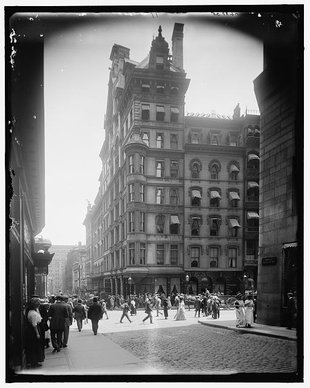
During the following summer my business necessitated my absence from home to an extent that we saw but little of each other and had but few opportunities to indulge in our favorite pastime. Early in the fall we met by chance at an uptown hotel. I noticed at once in him a strangeness of manner, an unnatural lustre in the eyes and a certain petulance when opinions were conflicting with his own, all of which convinced me that something i was wrong. Halliday held a position of great responsibility in one of the large importing houses in the city, and very often worked late into the night, and I felt that he was overtaxing his strength and vitality and needed a rest--- a change of surroundings--- and told him so. He signified his intention of so doing, and we planned then and there a canoe trip together up the waters of the famous West Branch in Maine to try the fishing as we went along. As we parted he seemed to have regained his old time cheeriness of manner and was especially jubilant over the prospective outing.
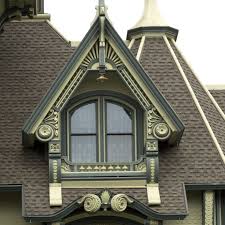
One Saturday afternoon a week later, contrary to my usual custom, I went directly home from my office, hoping that an afternoon's rest and quiet would in some measure relieve me of neuralgic pains that had aggravated me since the day before.
All the members of the family had gone to an afternoon matinee, so I had the house to myself. While reclining upon the couch where I was just beginning to feel comfortable I heard a familiar step upon the piazza, and without the usual preliminary knock, in stepped my friend Halliday. His face was flushed, his hair disheveled, and his eyes glowed with a strange luster.
"Hullo!" said he, "what's wrong? You didn't call for me this noon as usual."
I offered my indisposition as an excuse. He replied somewhat indifferently "Then indeed are we brothers in misfortune. I've been so for days."
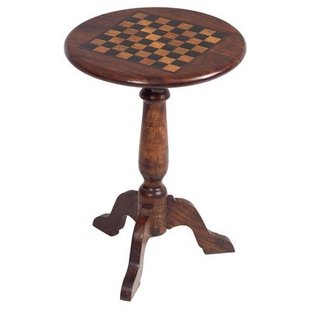
He seemed to be restless and ill at ease, walking repeatedly to the window and looking up and down the street, then picked up and examined the various articles of bric-a-brac upon the mantel that never before had excited his interest, all the time gently humming to himself. Happening to get sight of my checker table,--- a fine one, laid out in mosaic squares and won by me in a prize contest he proposed at once that we would have "a sitting." Thinking it best to humor him in his strange condition I assented, though with reluctance I seated myself at the table and arranged the checkers for play. Upon looking up I saw him standing facing me, with a cocked revolver in his hand.
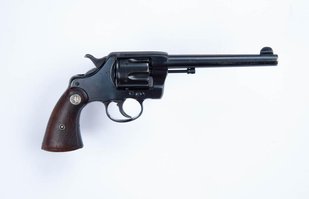
"Old man!" said he, "you and I have played many a game for fun, for the dinners or for the theater tickets; now we are going to play another kind of game, with our lives for the stake."
Alarmed by this remark. I started to my feet undecided just what course to take. His next action and remark however gave me no other alternative than to obey.
"Sit down!" said he, "and begin to play! This revolver has got a hair trigger and is liable to go off at any time. It is is going to be the match of our lives. If you fail to win or draw the entire five games that we shall play, I shall shoot you. If I lose I shall shoot myself. Ah ! that will bring out play that would be worthy of a Barker or a Yates. It is a glorious game."
Though inwardly despairing and fearful, I maintained an outward composure, and resolved to take immediate advantage of any unguarded moment or action on his part and grapple with and overpower him if possible, or at least, get possession of the deadly weapon.
With that intuition or cunning so often seen in people insane, he seemed to divine my intentions, and remained standing, making his moves with his left hand, and carelessly toying with the revolver in his right. If I had thought that his moves would be erratic and careless, owing to his mental condition, 1 was doomed to disappointment, for I never saw him play with more consummate skill. I resolved to play for a draw when any critical point should be reached, and rely upon two of my favorite openings to secure a win. I opened with the "New Sixteenth," knowing him to be not thoroughly "booked" in its variations. He studied the many pitfalls laid for him, and by remarkable play drew the game. Next followed the " Bristol" and the "Ayrshire Lassie" openings, each of which I drew with difficulty. At this, he smiled grimly and said. "You are doing well! You have certainly improved in play." But two games now remained to be played, and I breathed a bit easier.
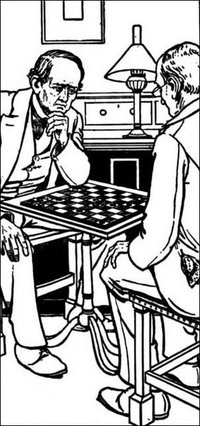
I opened with the famous "Glasgow" an opening that has been a favorite with those great masters at draughts--- Barker, Yates and Wyllie--- and that has won for them some of their most famous matches. But in my alarmed state of mind, I had forgotten that he had made a profound study of this opening, and all of its strong and beautiful lines of play. In all my previous "sittings" with him I was invariably worsted. What had I been thinking in allowing myself to be drawn into this line of play?
He noticed my ill-repressed agitation, and tapped his revolver significantly. "Then you do not like the 'Glasgow', and yet you play it!" he remarked with a small laugh that did not please me at the time.
I replied blandly that I regarded it as the very finest of the Scotch openings, as it afforded the best opportunities for brilliant play, with however this mental reservation, that there were times and conditions more propitious than the present for a thorough enjoyment of the opening.
I made here the desperate resolve that if I failed either to win or draw I would overturn the table and grapple with him regardless of consequences. As I stole a stealthy glance at him, I noticed that his air of intense concentration seemed to be flagging, though he was still a formidable as well as a dangerous foe. Much to my surprise he failed to take advantage of an exchange that would have won for him the game, and I lost no time in improving my opportunity--- the first that had occurred--- to draw the game.
Only one more game to play! The pace was beginning to tell upon me and all the variations of all the various openings seemed to be jumbled together in my mind.
By an effort I collected my scattered wits and resumed play. He chose an English opening, bristling with traps and pitfalls and played to win. Gradually but surely he forced me into the following position.
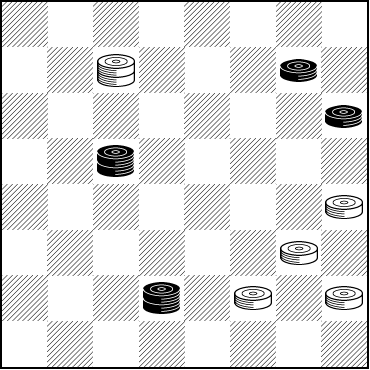
WHITE
White to Play and Win
W:WK6,20,24,27,28:B8,12,K14,K26
I felt the blood go from my heart at this unexpected problem. Halliday chuckled complacently and applied himself with his old time concentration and skill to the finish. I felt that there must be a win for whites, but what genius short of a Barker could force one ? And my crazed opponent relentlessly, with splendid play was pressing his advantage. I asked for a few moments of time. More or less would make but little difference to me now.

Suddenly my mind seemed to grow clearer, and I felt that both life and the game were mine. How many of the readers of this story can follow out the game and give a white win?
At this moment I chanced to glance out of the window, and I saw approaching the house, two athletic young fellows, who I knew had some business with me. I realized that not only my life but the life of my friend, which was none the less dear to me, was saved. With a nervous hand I made the final move that secured for me the game.
Halliday stared at the position a moment, then without a word raised the pistol to his temple. I had but little time to decide what to do, and to have clinched with him without first disabling him, would haye been simply suicidal. Quick as a flash I grasped a footstool near at hand and hurled it with all my force at the uplifted hand, at the same time overturning the table and grappling with him.
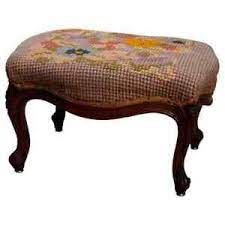
The missile thrown by me went true to its mark. The revolver was discharged the bullet passing upward through the ceiling, while Halliday's arm, benumbed by the shock, fell limp and powerless at his side. The weapon dropped to the floor, where a sharp kick from my foot sent it to the farthest corner of the room. The noise of the discharge added to my calls for assistance caused my visitors to enter hurriedly, without the ceremony of knocking or ringing the bell.
My unfortunate friend fought desperately, but was finally overpowered. After securing him so he could do no injury to himself or to others, medical aid was summoned and he was removed to a place where he could have the best possible care and treatment. Beyond a sprained wrist and slight shoulder bruises, my friend was uninjured.
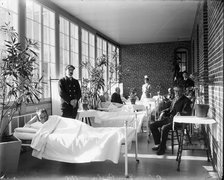
Halliday remained in a sanitarium until the following spring and passed the summer mouths hunting and fishing in the Canadian Rockies. He returned to his business in September of that year in splendid physical condition fully recovered from his strange malady. Strangely enough he retained no recollection of the time when he played a checker match with his dearest friend, the stakes being a human life.

Halliday and I took that trip up the West Branch the following summer, and tramped it together over the northern peaks of the Presidential Range, N. H. with the ever popular Charley Lowe as guide but when the subject of checkers is brought up each seems to be willing to concede the question of supremacy to the other.
The problem is an excellent one although certainly not easy. See how you do--- thankfully no lives are at stake--- and then click on Read More to see the winning method.![]()
Solution

WHITE
White to Play and Win
W:WK6,20,24,27,28:B8,12,K14,K26
[FEN "W:WK6,20,24,27,28:B8,12,K14,K26"]
27-23*---A 26x19 24x15 14-10 20-16*---B 10x19---C 6-10 19-23 16-11 8x15 10x26. White Wins.
A---24-19? 14-18 27-24 26-31* 6-10 31-27* 10-7 8-11* 7x16 27-23 19-15 12x19 15-11 18-15 20-16 15x8 24x15 8-12 16-11 23-19 15-10 19-15. Drawn.
B---In order to win, White must give Black 3 ways to jump!
C---12x19 6-2 10-14 15-10 14x7 2x4. White wins.
The original problem included in this story back in 1908 was this rather uninteresting variant of 3rd position.
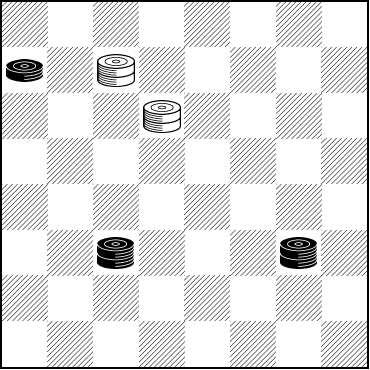
WHITE
White to Play, Black to Win
W:WK6,K10:B5,K22,K24
You can easily use your computer or a reference book to find the solution, but instead of using this we included a far better problem given to us by grandmaster composer Brian Hinkle, who also provided the solution and notes as given above. We changed the wording of the story slightly to accommodate this improvement.
We hope you enjoyed this excursion into checker fiction which for once wasn't written by us!
You can email the Webmaster with comments on this article.
